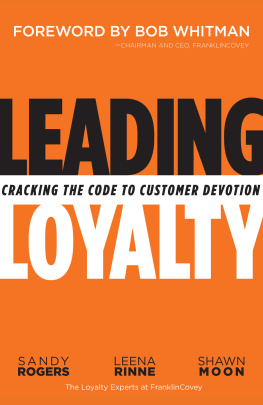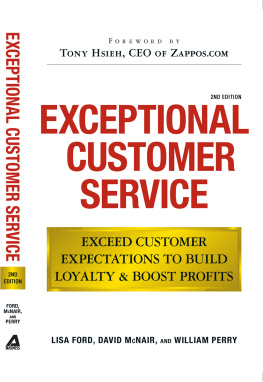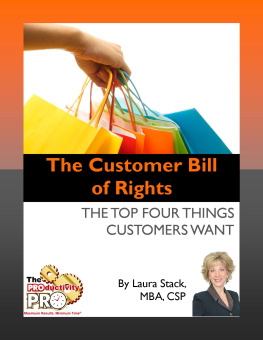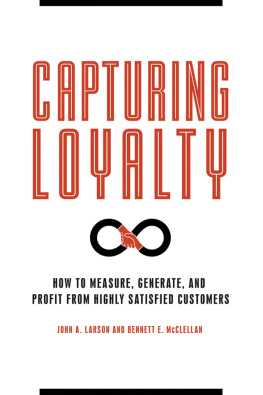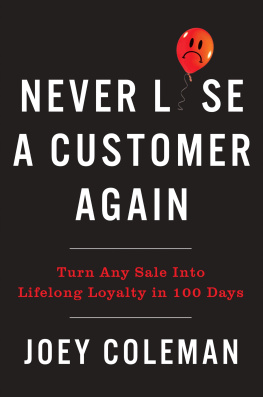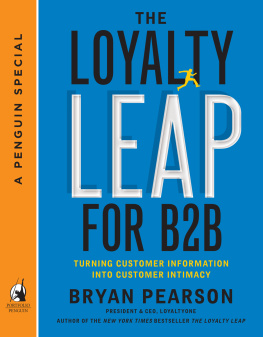TABLE OF CONTENTS
Guide
SANDY ROGERS
Sandy Rogers founded and leads FranklinCoveys Loyalty Practice, a FranklinCovey offering that helps organizations increase customer and employee loyalty. He was previously Senior Vice President at Enterprise Rent-A-Car. During his fourteen years there, Sandy managed the turnaround of the London, England, operation and led the teams that developed Enterprises marketing and fleet services strategies, the advertising campaign Pick Enterprise... Well Pick You Up, and the system for measuring and improving customer service across all branches. Before Enterprise, he worked in marketing at Apple Computer, and in brand management at P&G. Sandy has a bachelors degree from Duke and an MBA from Harvard Business School.
LEENA RINNE
Leena Rinne is FranklinCoveys Vice President of Consulting. She is responsible for the hiring, development, and management of FranklinCoveys world-class consultant team and is responsible for the ongoing high-quality delivery of its programs and solutions. Leena spent six years as a FranklinCovey Senior Consultant, focused on individual effectiveness and leadership development. She worked with leaders from the C-suite to entry-level managers to diagnose organizational gaps and develop solutions that achieved lasting change and measurable results. Prior to consulting, Leena was FranklinCoveys International Business Partner Lead, overseeing the operational support for thirty-nine licensed partners globally. Leena was part of the Innovations team that developed several core content areas, including The 7 Habits of Highly Effective People, Signature Edition 4.0, and The 5 Choices to Extraordinary Productivity. She is co-author of the Wall Street Journal best-selling book The 5 Choices: The Path to Extraordinary Productivity.
SHAWN MOON
Shawn has over three decades of experience in leadership and management, sales and marketing, program development, and consulting services. He led FranklinCoveys Direct Offices, as well as the Execution, Speed of Trust, Customer Loyalty, and Sales Performance Practices. He is the author or co-author of several books, including The Ultimate Competitive Advantage, Talent Unleashed, and Building a Winning Culture in Government.
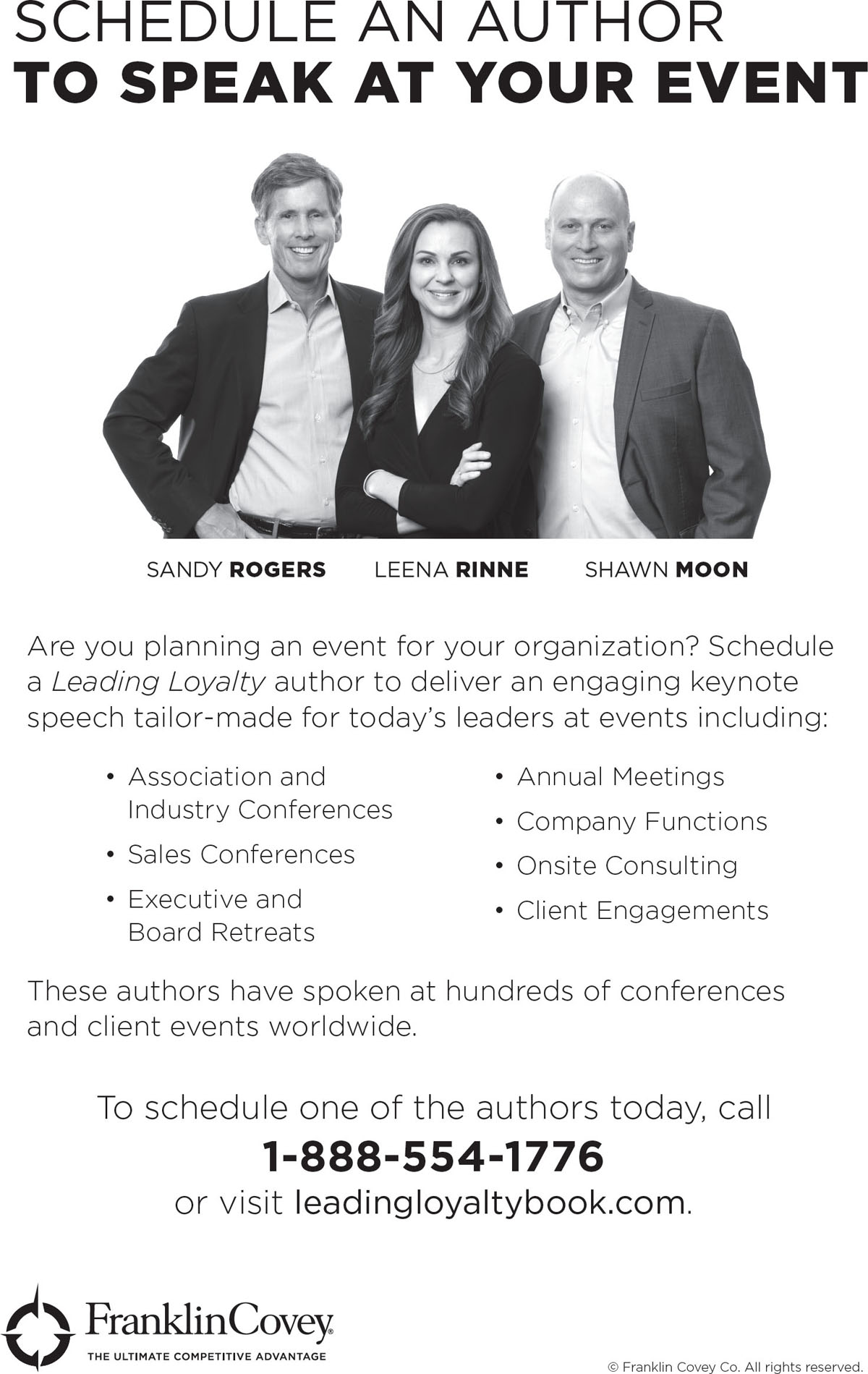
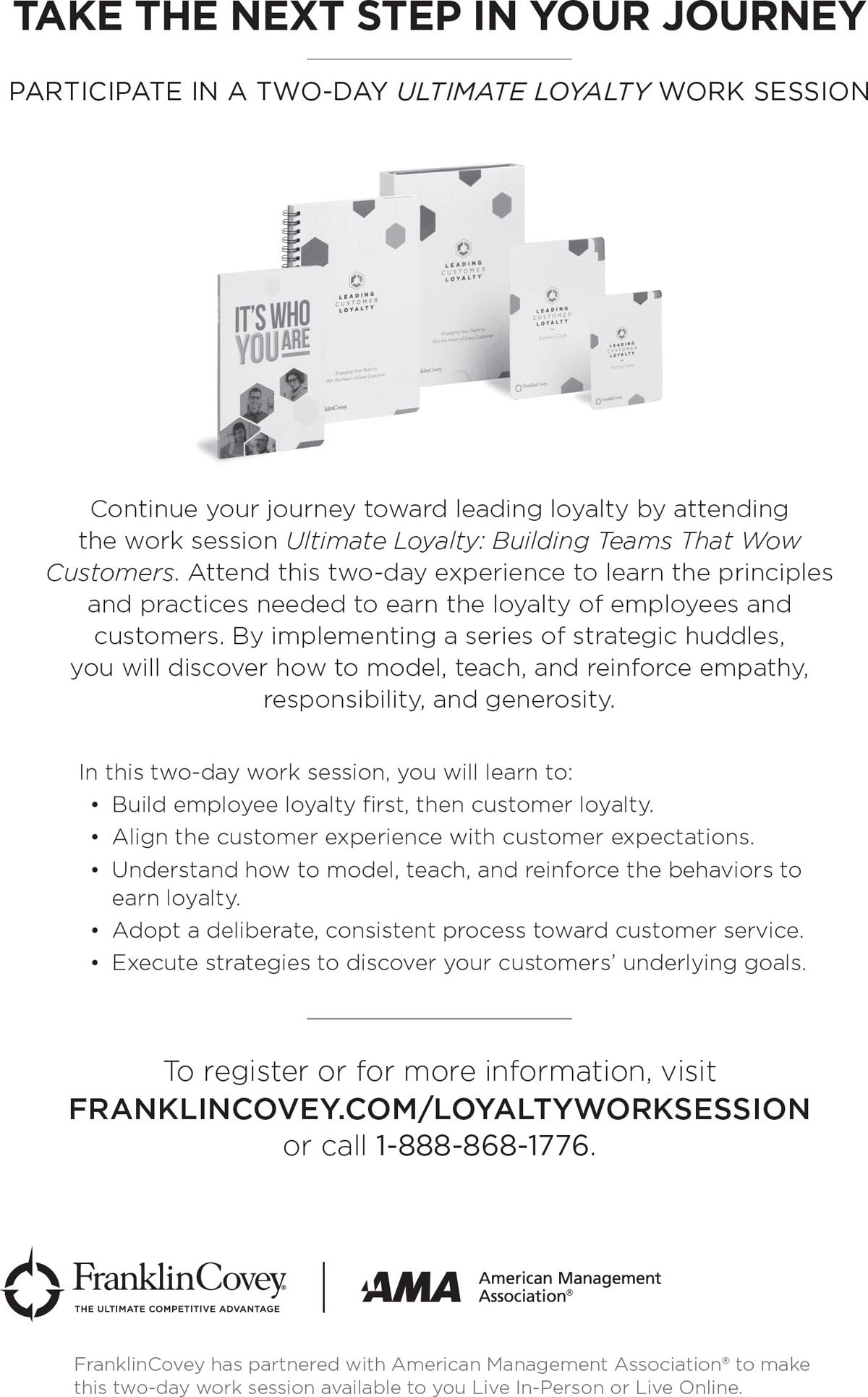
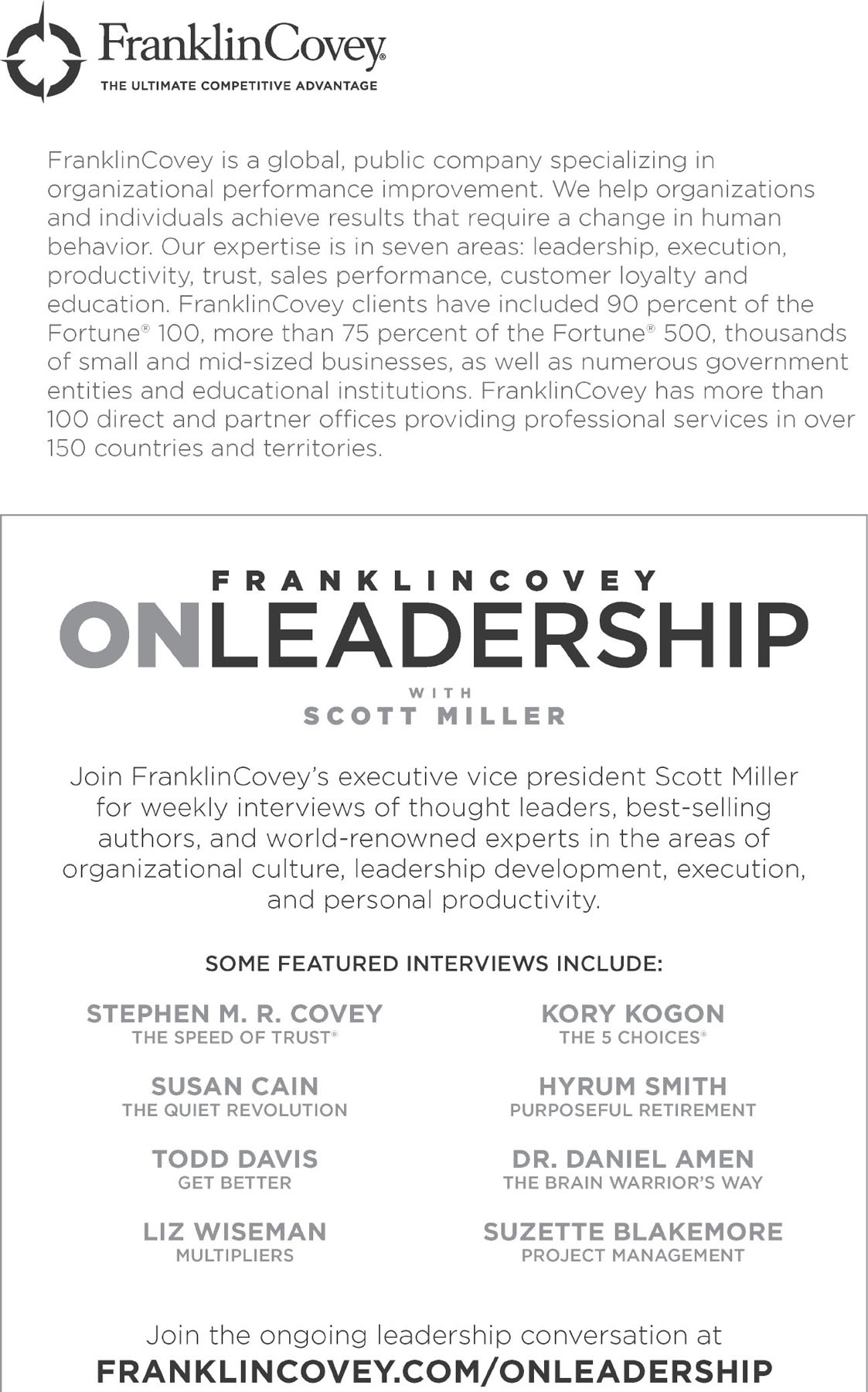
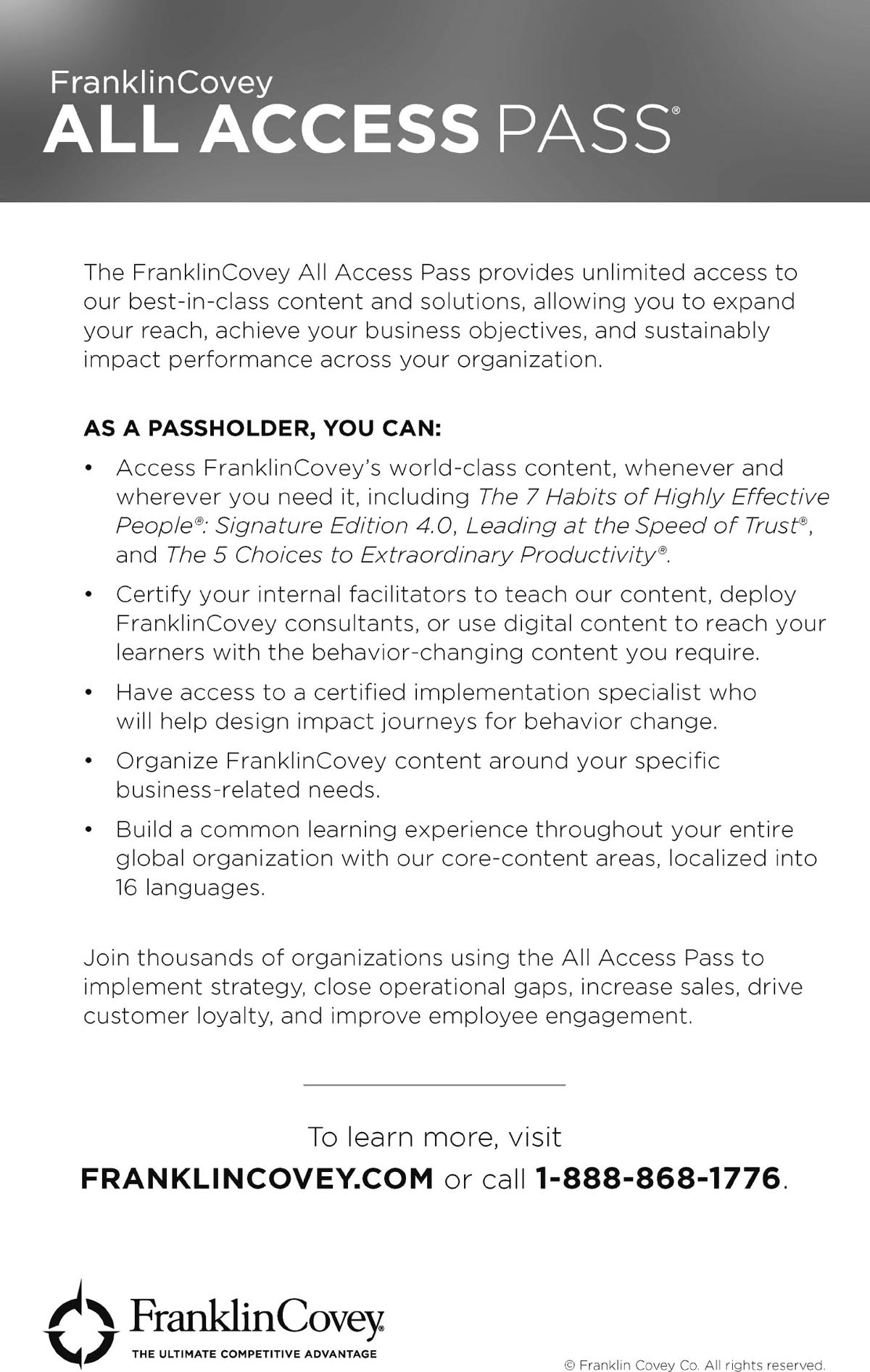

ITS NOT ENOUGH FOR YOUR CUSTOMERS TO LIKE YOUTHEY HAVE TO LOVE YOU.
CATHERINE NELSON, EXECUTIVE LEADERSHIP CONSULTANT
The paradigm we choose greatly influences how we see and react to the world around us. The Loyalty Leader Mindset can be expressed as:
I earn the loyalty of others by having empathy for them, taking responsibility for their needs, and being generous.
Our mindset relative to loyalty is profoundly influenced by our understanding of the answers to these questions:
Do you believe loyalty is essential to your success?
Who do you feel is most responsible for creating loyalty?
How can you earn loyalty from your customers and colleagues?
WHY DOES LOYALTY MATTER?
Our team at FranklinCovey joined with the Coca-Cola Retailing Research Councils to do a major study asking this question: Why do seemingly similar retail stores produce such different results?
We collected data from a cross-section of more than 300,000 employees in 5,000 work teams from 1,100 chain stores. We took the competitive environment of each store into account. We combined this data with customer- and employee-loyalty data and financial data, looking to identify the great performers among these stores.
What did we find? We found great performers, all right. Just not very many of them. It was like looking out over a campground at night. Its pitch dark, but here and there a campfire dots the landscape. Our findings were like that. We did see bright patchesstores that stood out from the rest in terms of revenues, profitability, and customer and employee loyaltybut they were few and far between. We called these campfire stores. Something was burning there that we didnt find in the average stores.
And we found something else: The customers of those campfire stores were incredibly loyal.
Stores with high customer-loyalty scoresboth in general and especially relative to their toughest competitorsare rewarded handsomely. In fact, if the average stores in a chain could raise their loyalty scores just a quarter of the way toward those of the campfire stores, overall profitability would rise a stunning 20 to 30 percent!
So, do campfire stores just happen? Does lightning unexpectedly hit in those stores? No, of course not. We found that the top-performing campfire stores earn a lot more loyalty because they deliberately focus on earning loyaltynot by chance, but by choice. Well explain how they do that throughout the rest of this book. But you can be sure they start with clarity about exactly what a great customer experience looks and feels like.
Because heres the irony: In a Bain survey of 362 top executives, 85 percent believed their companies delivered a superior customer experience. The really astonishing part? Only 8 percent of their customers agreed with them.
Are corporate executives really that out of touch? Maybe, but perhaps they dont define superior customer experience the way their customers do. The execs are probably looking at satisfaction metrics, which are more about lack of dissatisfaction than about experiences that earn true loyalty.
Of course, all good managers work to satisfy customers, and many do this pretty well. But at the same time, they frequently make a bad assumptionthey figure that if customers arent dissatisfied, they must be getting a superior experience; they must be happy, loyal fans. But just because your kid doesnt get Ds and Fs doesnt mean he or she is a great student. Likewise, theres a big difference between not disappointing customers and earning their loyalty.
For example, one hotel company was always saying they got 94 percent guest satisfaction, but when they started to measure true loyalty, they found that 94 percent guest satisfaction really meant 94 percent non-dissatisfaction. Only 18 percent of their customers were truly loyal. This hotel chain was claiming victory on the customer-service front, while a few competitor hotels that were deliberately focused on creating real loyalty were eating their lunch.
Even your regular customers are not necessarily loyal. The relationship between regular customers and profitability is weaker than most of us believe, according to a four-year Harvard research study involving 16,000 people: About half of those customers who made regular purchases for at least two yearsand were therefore designated as loyalbarely generated a profit.
However, customers with the attitude of loyalty are incredibly profitable. Customers who scored high on both actual and attitudinal measures of loyalty generated 120 percent more profit than those whose loyalty was observed through transactions alone. This is not just a business-to-consumer phenomena; its true in the business-to-business world as well.
Next page
